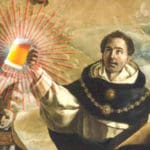If you’d like to support me and all the work I’m doing on patreon please do that here.
Learn more about Pints With Aquinas here.
…
Today we discuss the virtue of studiousness and the vice of curiosity.
Aquinas discusses in this in the Secunda secundae of the Summa (see below).
Here are some articles discussing the sin of curiosity:
A Monastic Vice For The Internet Age
Curiosity As the Enemy of Wonder
Here’s what Aquinas wrote:
The knowledge of truth, strictly speaking, is good, but it may be evil accidentally, by reason of some result, either because one takes pride in knowing the truth, according to 1 Corinthians 8:1, “Knowledge puffeth up,” or because one uses the knowledge of truth in order to sin.
On the other hand, the desire or study in pursuing the knowledge of truth may be right or wrong.
First, when one tends by his study to the knowledge of truth as having evil accidentally annexed to it, for instance those who study to know the truth that they may take pride in their knowledge. Hence Augustine says (De Morib. Eccl. 21): “Some there are who forsaking virtue, and ignorant of what God is, and of the majesty of that nature which ever remains the same, imagine they are doing something great, if with surpassing curiosity and keenness they explore the whole mass of this body which we call the world. So great a pride is thus begotten, that one would think they dwelt in the very heavens about which they argue.” On like manner, those who study to learn something in order to sin are engaged in a sinful study, according to the saying of Jeremiah 9:5, “They have taught their tongue to speak lies, they have labored to commit iniquity.”
Secondly, there may be sin by reason of the appetite or study directed to the learning of truth being itself inordinate; and this in four ways. First, when a man is withdrawn by a less profitable study from a study that is an obligation incumbent on him; hence Jerome says [Epist. xxi ad Damas]: “We see priests forsaking the gospels and the prophets, reading stage-plays, and singing the love songs of pastoral idylls.” Secondly, when a man studies to learn of one, by whom it is unlawful to be taught, as in the case of those who seek to know the future through the demons. This is superstitious curiosity, of which Augustine says (De Vera Relig. 4): “Maybe, the philosophers were debarred from the faith by their sinful curiosity in seeking knowledge from the demons.”
Thirdly, when a man desires to know the truth about creatures, without referring his knowledge to its due end, namely, the knowledge of God. Hence Augustine says (De Vera Relig. 29) that “in studying creatures, we must not be moved by empty and perishable curiosity; but we should ever mount towards immortal and abiding things.”
Fourthly, when a man studies to know the truth above the capacity of his own intelligence, since by so doing men easily fall into error: wherefore it is written (Sirach 3:22): “Seek not the things that are too high for thee, and search not into things above thy ability . . . and in many of His works be not curious,” and further on (Sirach 3:26), “For . . . the suspicion of them hath deceived many, and hath detained their minds in vanity.” – ST II-II Q. 167, A. 1.





Reader Interactions